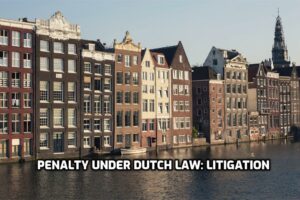Penalty under Dutch Law: litigation
Penalty under Dutch Law: litigation
As a Dutch litigation lawyer, I conduct many summary proceedings, in which fines and damages, penalties often play an important role. A penalty under Dutch law often requires litigation.
The penalty is sometimes underestimated in summary proceedings, which is unjustified.
This is certainly the case in Dutch summary proceedings: as a defendant, a lawyer is not obligated (but highly recommended), which sometimes is underestimated in litigation.
Penalty is an incentive to take action (or not)!
The penalty is intended to give someone an incentive to do or not do something or not to do something correctly. The amount of the penalty must therefore be somewhat in proportion to the prohibition or order. Judges under Dutch Law can reduce a (too) high penalty on a claim. It is a misconception that a penalty is some kind of fine.
The case of Peter R. de Vries teaches that not complying with a Dutch judgment and (deliberately) forfeiting penalties for injustice is also unlawful. A very recent ruling from 2019 confirms the case of Peter R. de Vries: penalty payments are not a kind of commutation. So, a sentencing judgment in which a maximum of EUR 50,000 for non-compliance can be imposed does not mean that you no longer have to comply. In fact, you can still start legal proceedings (and a request for a higher penalty!).
In a judgment of the Dutch Court, Den Bosch once again shows how important it is to pay close attention when there is a judgment with penalties. Penalty under Dutch Law often requires litigation.
Litigation about penalty under Dutch Law?
It can be inferred from the judgment that the parties are involved in many different proceedings. It is a company engaged in the sale, repair and service of cleaning systems, where there is a dispute between the company and the director and shareholder of the company, who at some point has been fired as a director. That dismissal apparently led to a multitude of proceedings and in these interim relief proceedings it concerned a judgment in which the director had requested to inspect the annual accounts, including annual report and data for the period from 2012 to 2015. This was initially awarded in a procedure, but no penalty payments had been demanded. That is disappointing, because then you are dependent on the good will of the other party. It is true that sentences must be complied with, but there was no leverage here to do so completely and in a timely manner. This prompted the director to conduct summary proceedings, which resulted in a judgment with penalties. The judgment states that the company must provide the director with the annual accounts (including annual report and data) for the years 2012 to 2015, as well as all notes from the shareholders’ meetings, and if the company does not do so, a penalty to be paid of EUR 2,500 for each day that it does not comply with the decision, with a maximum of EUR 50,000. You guessed it: there is nagging about compliance with the verdict.
Who determines under Dutch whether a penalty have been forfeited?
The director had the judgment served, after which the company gave the director the opportunity to inspect documents. Regarding the reports, it was indicated that there would be no reports. The director was of the opinion that the judgment had not been complied with and indicated that EUR 50,000 in penalties had been forfeited. This was also the reason for the director to initiate the forced sale of (movable) property of the company.
The company did not agree with this and has started summary proceedings, in which it was indicated that the director would no longer have an interest in the conviction, because the director is no longer a shareholder. It was also indicated that the documents would no longer exist and that the judgment would be based on a factual and / or legal error and finally it was indicated that there was a permanent impossibility, whereby the penalty payments should be lifted.
Interim injunction for cease and desist penalty Dutch law
The summary proceedings were lost by the company. In appeal it is about whether the court has done this correctly. The Court first addresses the interests of the director / shareholder. The starting point is that an enforcement can be suspended if the court is of the opinion that in this case the executor has no reasonable interest to be respected in making use of his authority to execute and thus the collection of the penalties. It is settled case law that a so-called execution judge has a limited task. In other words: the judge will decide whether the execution is justified on the basis of the judgment.
The Court is of the opinion that the penalty payments have been forfeited. The Court ignores the statement that annual reports are missing.
What could the company have done to avoid penalty payments?
The company could have gone to an interlocutory court earlier to indicate that the conviction could not be fulfilled, thus limiting the risk of forfeiting penalties. However, the company has chosen, and that is risky, not to submit all reports, the director subsequently indicated that penalties have been forfeited, after which the company had to defend itself against this and both the Court and the Court of Appeal do not agree.
What does this verdict teach about periodic penalty payments?
Periodic penalty payments are useful for a claimant, but dangerous for a defendant. It is very important as a claimant to properly formulate the request, the demand, and to clearly motivate why penalties are necessary in a procedure. As a defendant it is important to put forward a defense against penalty payments and also to indicate exactly why a possible conviction would not be enforceable. In the face of a possible judgment, it is important to take action quickly, in close consultation with a lawyer specializing in Dutch penalty law.
Lawyer Dutch penalty litigation
If you have any questions about this blog, do not hesitate to contact me, Jasper Hagers.


